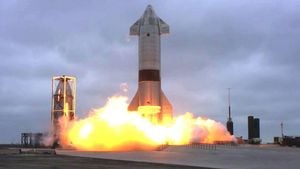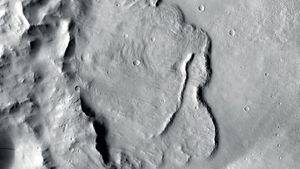August's supermoon blue moon, the first of 2024's four consecutive supermoons, will appear full from Sunday through Wednesday, giving astronomy fans a rare show when they look to the skies. The full moon will reach peak illumination on Monday at 2:26 p.m. EDT, but it will appear full for three days, NASA said.
While the full moon will peak on Monday, it will first appear full on Sunday morning, continuing its illuminated display through early Wednesday morning. On Sunday, around 98% of the moon's nearside will be illuminated by the sun, reaching 100% illumination by Monday.
The moon can be easily observed with the unaided eye, but binoculars or telescopes can provide even more stunning views. Supermoons occur when the moon's orbit brings it closest to Earth during its full phase, according to NASA.
This month's supermoon will be about 225,288 miles away from Earth, making it appear larger and brighter—about 16% brighter than the average full moon. For comparison, its distance varies, sometimes reaching up to 252,712 miles.
Following the August supermoon, September's full moon, known as the Harvest Moon, will peak on September 17. The October full moon, famously called the Hunter's Moon, will peak on October 17, and the series will culminate with November's Beaver Moon on November 15.
Interestingly, the term "blue moon" doesn't refer to the color of the moon itself. This special moon is simply the third full moon occurring during a season with four full moons, as defined by NASA.
August's moon also goes by the name "Sturgeon Moon," taken from the fish that's plentiful this time of year. Other names for this month's full moon include the Red Moon and the Corn Moon.
The supermoon spectacle will be accompanied by another astronomical event: the potential visibility of nighttime rocket launches from Florida's Space Coast. Depending on weather conditions, locals around the Treasure Coast can catch sight of spectacular launches from Cape Canaveral, where SpaceX is set to send more Starlink satellites aloft.
The next launch is scheduled for August 20, 2024, involving another batch of internet satellites aimed at enhancing global connectivity. SpaceX has optimized launch windows so the rocket shines brightly against the dark sky, creating stunning visuals for photographers and enthusiasts alike.
After the launch of prior rockets, experts noted the photogenic contrails left behind. A well-timed launch during twilight can make for especially breathtaking shots as the exhaust glows against the deepening night sky.
For those hoping to witness both the supermoon and the rocket launches, timing is key. Individuals along the Treasure Coast will need favorable weather, as cloud cover could obscure their view of either event.
One effective viewing location for upcoming rocket launches includes Sebastian Vero Beach, thanks to its clear line of sight. While not all areas may catch the full display, plenty of spots to gather and celebrate the nighttime sky exist.
With the excitement of the upcoming celestial and space events, enthusiasts shouldn't forget to bring their cameras. Unique opportunities for breathtaking photos are sure to emerge as this combination of celestial events captivate the night.
For families or aspiring astronomers, these events provide significant opportunities to bond and explore the wonders of space together. The vibrant displays of both phenomena prompt fond conversations about the mysteries and marvels surrounding our universe.
Combine the pleasure of observing the supermoon with the thrill of rocket launches. This August invites everyone to look up, enjoy the sky, and perhaps witness something truly spectacular.
Plan for some late-night or early-morning stargazing sessions. August’s supermoon, viewed side-by-side with the spectacle of rockets lighting up the sky, offers numerous reasons to stay awake.
Make sure to keep up with local weather forecasts which can help determine the best time for viewing. While moon watchers can still enjoy its glow on cloudy nights, rocket launches demand clear skies for optimal visibility.



